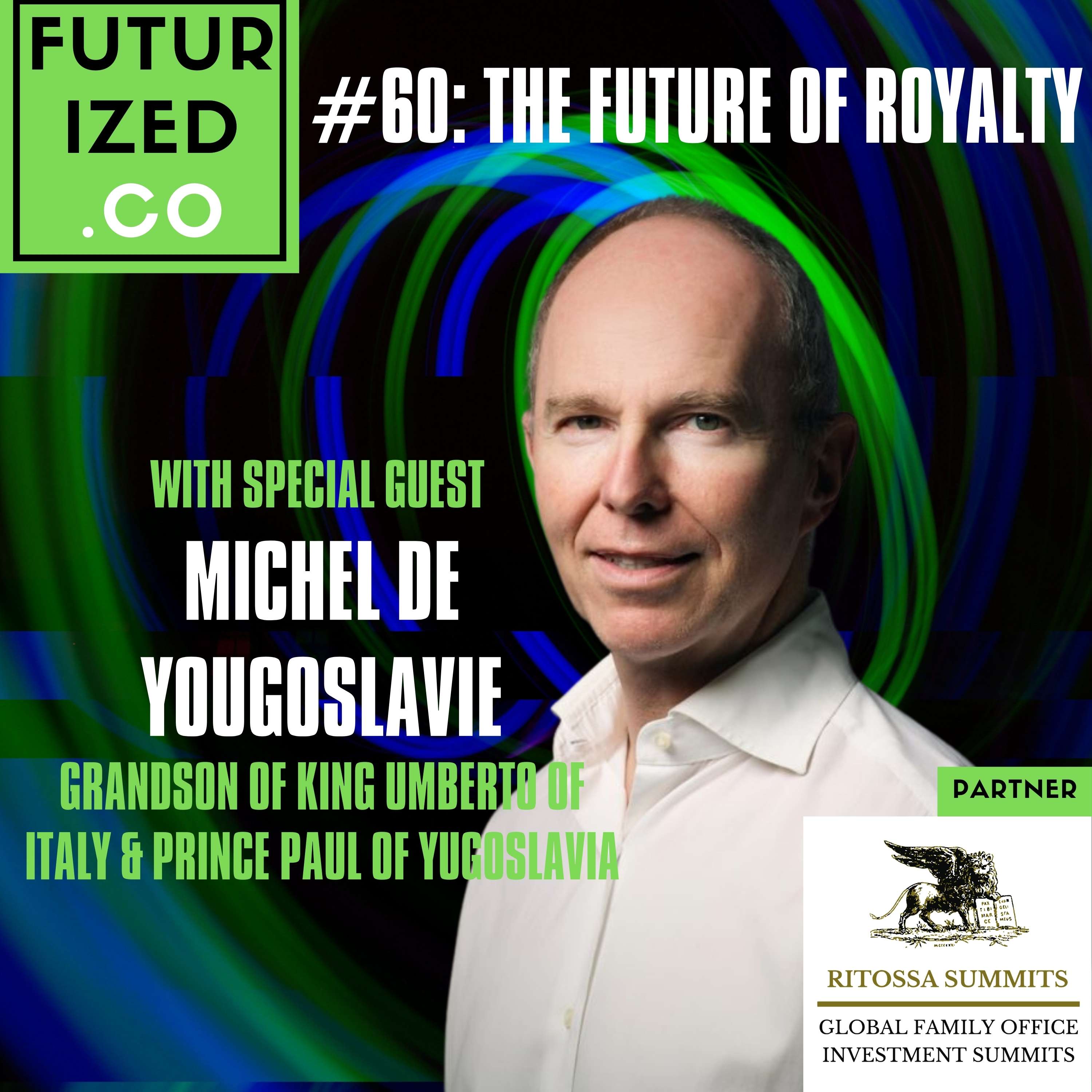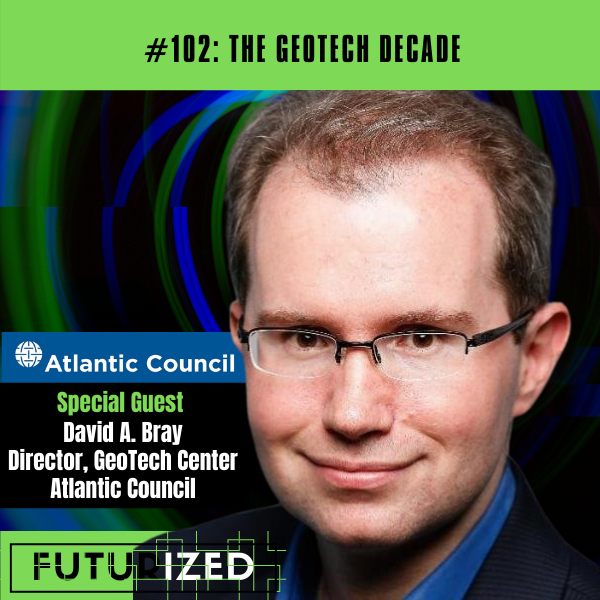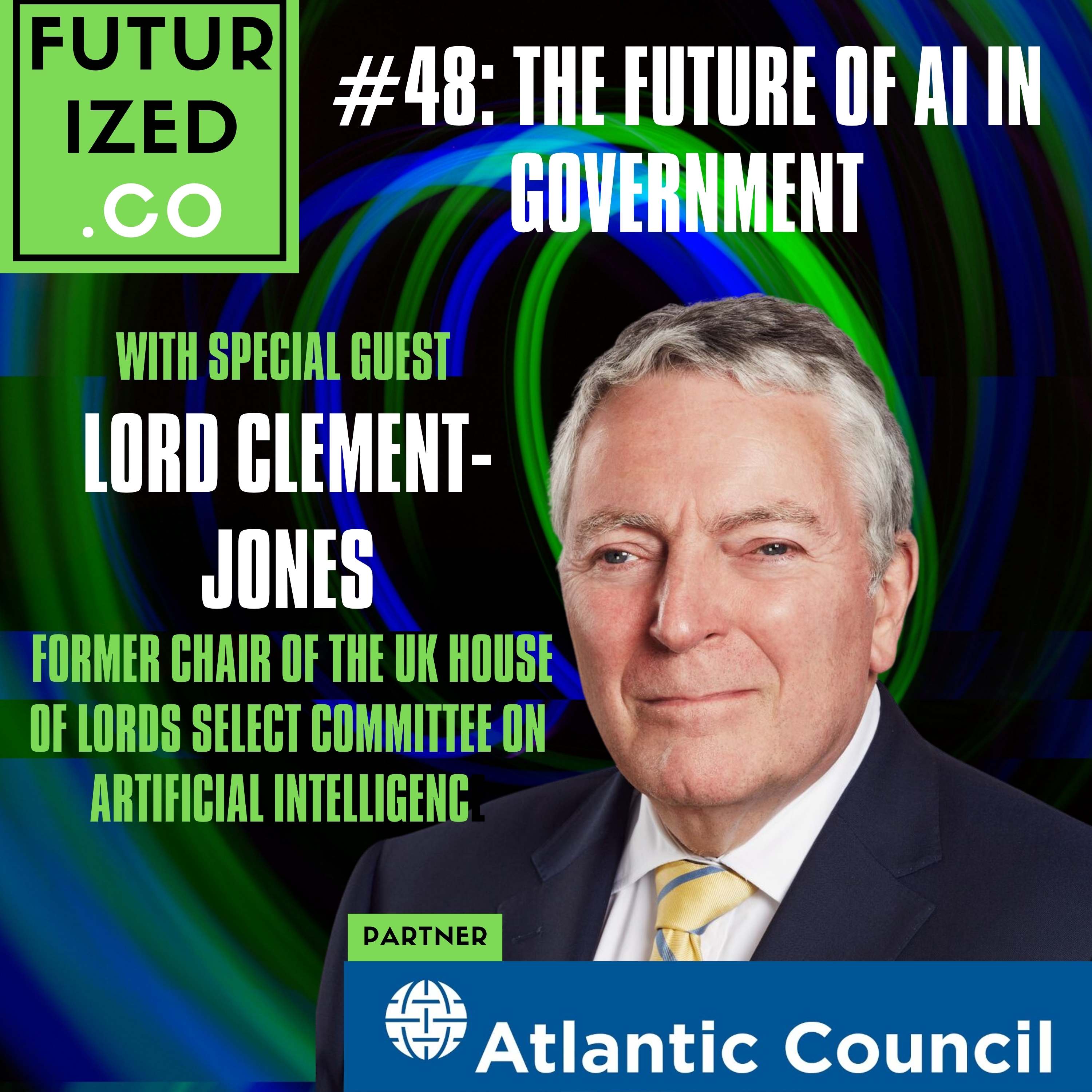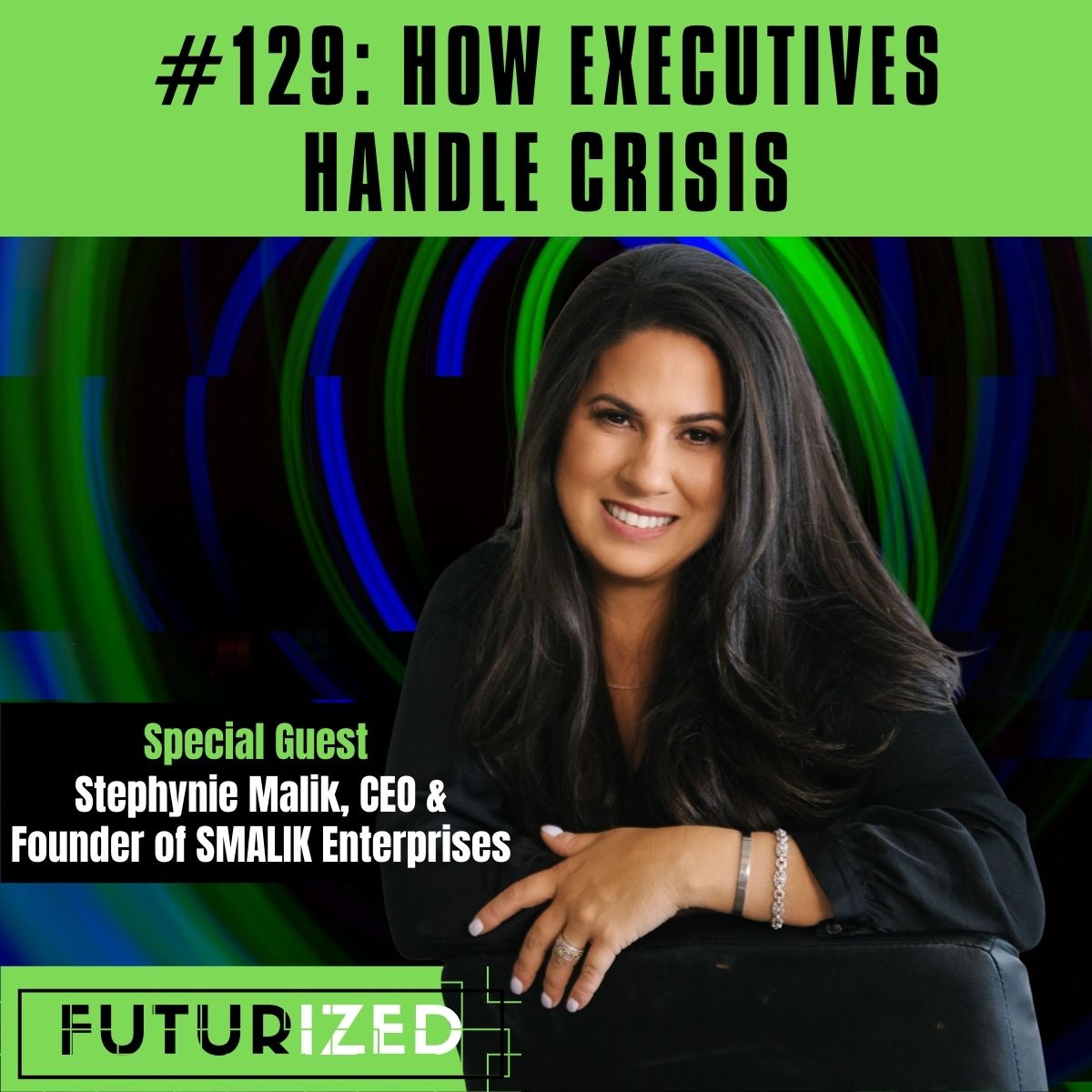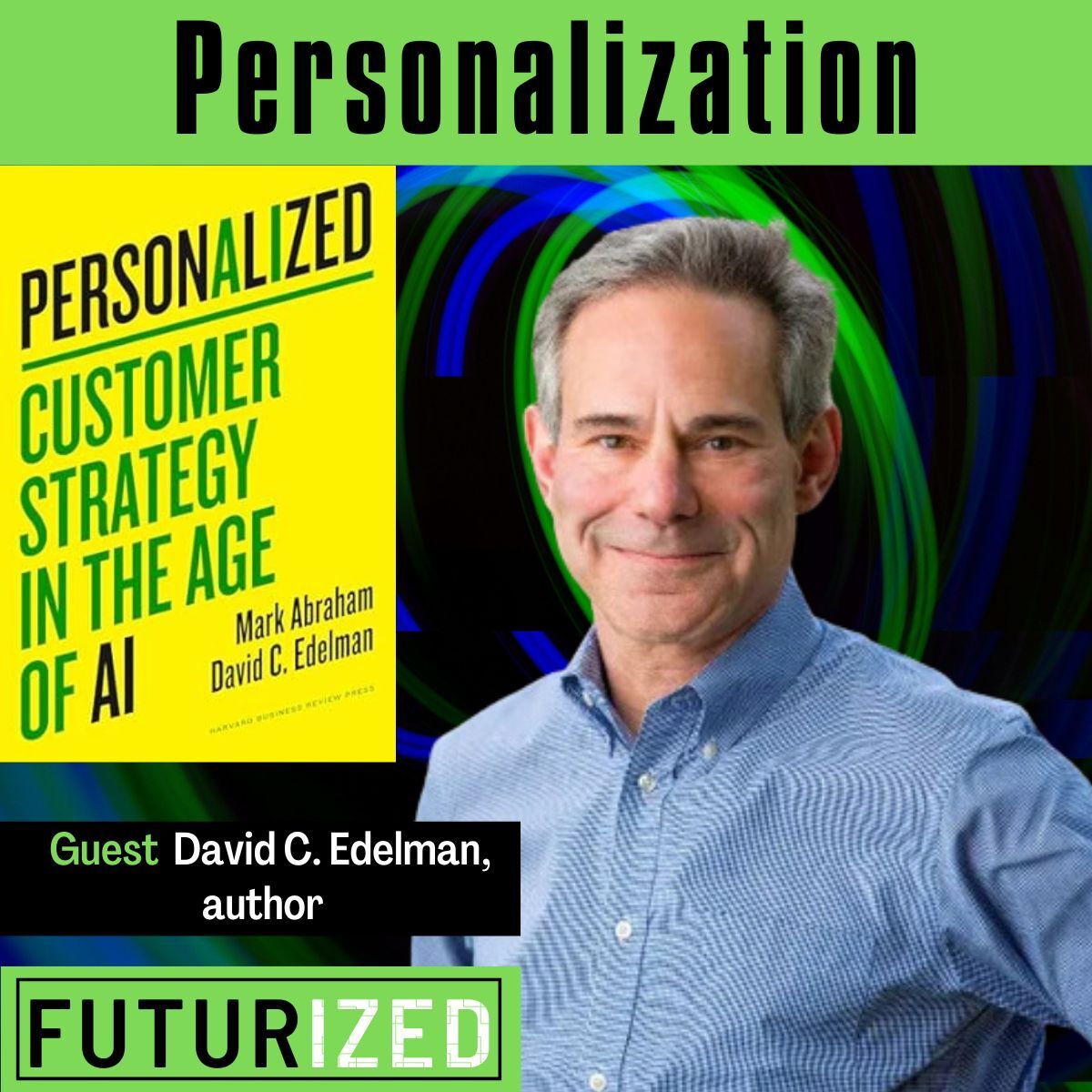DeFi's impact on Business and Society
Julian Hosp, CEO and co-founder of Cake DeFi, interviewed by futurist Trond Arne Undheim.
In this conversation, we talk about how DEFI emerged and what problems it fixes. We cover the problems in centralized finance—centralized control, limited access, i...
Julian Hosp, CEO and co-founder of Cake DeFi, interviewed by futurist Trond Arne Undheim.
In this conversation, we talk about how DEFI emerged and what problems it fixes. We cover the problems in centralized finance—centralized control, limited access, inefficiency, lack of interoperability, and opacity. We then discuss the future of the DeFi industry.
After listening to the episode, check out Cake DeFi as well as Julian Hosp's social media profile:
Trond's takeaway: DeFi is now more than a niche phenomenon, it is already in the real world of finance, used for payment, currency creation, and credit scores. DeFi might just alter banking as we know it, but don't count out centralized institutions taking a key role in its rollout, since blockchain can serve many purposes, including contribute to maintaining the status quo.
Thanks for listening. If you liked the show, subscribe at Futurized.org or in your preferred podcast player, and rate us with five stars.
If you like this topic, you may enjoy other episodes of Futurized, such as episode 99, Blockchain uncapitalism on desktop PCs, episode 59, The Tokenization of Securities, or episode 44, The Future of Open Finance.
Futurized—conversations that matter.
To find us on social media:
- Instagram: https://www.instagram.com/futurized2/
- Twitter(@Futurized2): https://twitter.com/Futurized2
- Facebook: https://www.facebook.com/Futurized-102998138625787
- LinkedIn: https://www.linkedin.com/company/futurized
- YouTube: https://www.youtube.com/Futurized
- Podcast RSS: https://feed.podbean.com/www.futurized.co/feed.xml
DEFI's impact on Business and Society_mixdown-1
Trond Undheim, Host: [00:00:00] Futurized goes beneath the trends to track the underlying forces of disruption in tech policy, business models, social dynamics, and the environment. I'm your host throne Ana in high futurist and author in episode 119 of the podcast. Topic is Defy's impact on business and society. Our guest is Julian hosp CEO and co-founder of cake D five.
[00:00:26] In this conversation, we talk about how it emerged and what problems defy fixes. We cover the problems in centralized finance, centralized control, limited access, inefficiency, lack of interoperability and a Pasadena. We then discuss the future of the defy industry. Julian, how are you?
[00:00:49] Julian Hosp, Cake DeFi: [00:00:49] Hey pleasure. I'm doing good.
[00:00:50] How are you?
[00:00:52] Trond Undheim, Host: [00:00:52] Yeah, I'm doing fine as well. Look, there's so much to talk to you about Julian and I don't even know where to start, but I will start since it's my responsibility to kick this off. Let's work this a little bit. You are not only a leading figure in crypto, but of course you have a background as a kite server.
[00:01:09] You're also a doctor and you written books. You're a speaker. You're doing all the right thing. How did it all come together? Give me a sense of Julian as a five-year-old, let's start there.
[00:01:21]Julian Hosp, Cake DeFi: [00:01:21] Most of the times I do the right things every once in a while you step totally in the wrong direction.
[00:01:25]I guess from a very young age on, I was an avid learner. I've always been someone who loves trying out new things. And I think that's the red lines from my life. If you want to call it, it's always been about the world is yours. Be curious don't get comfortable in, in not growing.
[00:01:41]So for me it was always it was always trying out new things learning, growing, in everything that I do, that's the premise.
[00:01:48] Trond Undheim, Host: [00:01:48] Did you know that sports was not going to be your only thing, even though you were highly successful at it?
[00:01:56] Julian Hosp, Cake DeFi: [00:01:56] So my mom always tried to convince me. She was always like Julian, that's not going to pay the bills when you're 40, it's fun and great when you're 20 and there's no one to take care of and it's just yourself.
[00:02:08] And you have, at the end of the month, the bank account just goes to zero and it's all good. Once you have a family and a child, and at some point you need to do something serious. Yeah, I always, deep inside, I kinda knew that. But for me, look, I was 17 turning 18. When I learned how to kitesurf.
[00:02:27]For almost 10 years, I was paid to travel the world. To see over a hundred countries to, yeah. To be gone for about 250 days in a year. I had this tagline on my Facebook account, your dream holidays, my daily office. And it was the best thing that you could give a 20 year old. I think there was no better time obviously to do that.
[00:02:51] Just live in the moment. I had, I really, I flew to Brazil, kitesurf there for three months. I had no clue how I'm going to pay for the flight back. What the curious thing is, I didn't even care. It didn't matter. And it was so pure life was so pure. And that also gives me a lot of peace today.
[00:03:06] So I don't have to travel. I'm like with the COVID situation. Yeah, sure. I would have loved to leave. I live in Singapore today. I would have loved to leave the island and, but I, yeah it's all good. I've seen so many things. Yeah, look, I
[00:03:19] Trond Undheim, Host: [00:03:19] think that gives you an important confidence and balance, right?
[00:03:22]You have a bit more patience, I guess now than in your inpatient, a wild roaring twenties,
[00:03:29] Julian Hosp, Cake DeFi: [00:03:29] yeah. I wish I wish I was a bit more patient. I think. I don't know who always says this, but make you mistakes early try out so many things, do your mistakes as early as possible.
[00:03:37] I lost all, I made tons of money in my kite surfing times just because that's so many great sponsorship deals. And I was just one of the first ones in that market. And I'm I lost it all with stupid decisions when I was 22. And that was a lot of money. I lost 80,000 euros. So about a hundred thousand dollars.
[00:03:55] Yeah. Like looking at a real grownup with a family, maybe a hundred thousand dollars, not that much capital anymore, but for 22 year old, that's a lot of money and I lost it all. And there were so many important lessons in there that, yeah, it's good that I lost it early.
[00:04:12] Trond Undheim, Host: [00:04:12] I'm so glad you shared this because you must be aware of it.
[00:04:16] When you are very successful and the stuff you're doing now is successful and you come off as just very confident. It actually, isn't it's like people are attracted to it, but they're also a little scared and they're a little annoyed. So I think it's good that you share that the journey hasn't exactly been always.
[00:04:32] Perfect.
[00:04:33] Julian Hosp, Cake DeFi: [00:04:33] A perfect is far from reality. I made, I don't know. I don't sometimes I'm like I don't know if I'm, if I did more things right in life or more things wrong. And I don't know, I guess the good thing that the really good thing is if you don't do anything super stupid, that, that is, that has really like permanent consequences.
[00:04:54] Life is actually really forgiving in a sense that. You don't have to hit that many balls do to to get to where you want to get. It's actually okay. If you miss 10 and then suddenly one coming just perfect and you just swing to sing and it's a home run and life. Like I, people, I think people tend to forget that.
[00:05:14]And people, after missing two balls, they get scared. They get discouraged. And I think that's a really that was one of the things I just got to learn in life.
[00:05:24] Trond Undheim, Host: [00:05:24] You have said that your vision is to blame and to bring blockchain awareness to a billion, more people by 2025. That's first of all, a lot of people, second of all, enormously aggressive timeline.
[00:05:38]How's that going?
[00:05:39]Julian Hosp, Cake DeFi: [00:05:39] I set that goal in 2015, so it's now six years ago. I was just coming. So I worked in, I worked as a medical doctor until 2012 and then I was just missing all these freedoms in life and being able to do to travel and trial things and just again, grow, be a bit crazy.
[00:05:58] And so for about two and a half years, I was stumbling with. Left and ride back and forth. Not really knowing where I was going to end up in 2014, I learned about blockchain and in 2015, that, that ecosystem really got me. And I started educating specifically to German speaking market, but also the international market.
[00:06:16] And so I always said, I need to do something that really excites me. Just having a YouTube channel. I don't know if that really gets me up for every video. And so I said, Hey, what really excite me is over the next 10 years. There's a billion people who learn about blockchain because somehow I help them.
[00:06:33] And yeah, that has always been driving me. I would say that I don't know, probably 90% of the German speaking market actually learned about blockchain and crypto because of my videos, because of my books, because of a lot of things that I've done. Will I get to a billion people by 20, 25?
[00:06:51] Probably not, it doesn't matter because there's millions of people that got into blockchain and I probably wouldn't have touched those millions of people had not set the goal of a billion people. Cause I wouldn't have.
[00:07:03] Trond Undheim, Host: [00:07:03] Fascinating. Fascinating stuff. So you do have quite a big following in both the crypto space and in, I think, yeah.
[00:07:11]Other places, a hundred thousand regular followers you claim is that kind of across all your channels? A lot of it is YouTube. A lot of it is.
[00:07:19] Julian Hosp, Cake DeFi: [00:07:19] Now it's almost a million. Yeah, I don't know it was update the numbers. I have now 200,000 on YouTube. I'm getting close to a hundred thousand on Twitter, on Instagram, on Facebook, humongous emails, subscriber list.
[00:07:32] Yeah, a huge podcast. Again, I would say 75% is German speaking and then 25% is internet. Yeah, it's across all their various trends. Yeah.
[00:07:43] Trond Undheim, Host: [00:07:43] Got to some of the substance of it because it, it is indeed actually a field that needs education in the sense that it's moving. It's fast moving super interesting.
[00:07:52] It's changing things in the world, but how do you think of your role as an influencer? Do you think. You have a special responsibility. What's w once you've succeeded at having a, fairly enormous reach, this is a great, that's a very big reach. What is your responsibility?
[00:08:09] Do you think about that when you issue a new video? Have I really understood this, what people are going to do with this insight? Because influencer. Then that's the point you influence people's decisions and these are financial decisions. They're not just, oh, I'm going to go buy a record by, this artist.
[00:08:27] No, this is the real deal, it could be they're investing money that they would have put in their house or something. And it based on listening to you.
[00:08:37] Julian Hosp, Cake DeFi: [00:08:37] Yeah. I don't see myself as an influencer. I guess I am, but I always see myself as a business owner for me, social media is really a tool.
[00:08:44]As an extension for my business. When I talk about, when I talk about things, especially in a financial site, most of the time or most, all the time, I actually talk about when people should invest, that they should invest in Bitcoin. And I have, and I talk about investing single digits in percentages of their own of their own liquid capital.
[00:09:06] I feel very comfortable that such a statement. Is in a worst case, not destructive to the entire situation and in a best case, really impactful to their financial situation. And so that's, and that's what I always expect. I think through, I always think through the worst case scenario that I'm going to about that, I'm about to talk, what would be the effect and what is the best case.
[00:09:35] And I try to weigh those and then I always go a bit on the cautious. Simply because I know how people are. I tell them, Hey, take 1% and put it into Bitcoin. And they're like, oh, he said go all in. And and then, yeah. So I always try to be on the extra cautious side. Yeah. And you see it as an all the, there's a lot of crypto YouTubers and a lot of and I guess the biggest thing that I always get is that.
[00:09:57]Someone who's super, super rational. I don't do daily trading updates. I always talk about a four year, five year, 10 year time horizon. I feel very comfortable discussing these things. So when someone says, even at 65,000 Julianne, should I buy a Bitcoin? And I'm like, yeah, you should put 5% of your holdings into Bitcoin.
[00:10:16] And I would say over the next five to 10 years, I'm very confident that the prices are going to be hired in the 65,000. Maybe not next month, maybe not in three months. And so that is just how I try to approach them.
[00:10:27]Trond Undheim, Host: [00:10:27] Let's get into the meat of it. So what is it about decentralized finance, first of all, how do you explain it to people and what are the problems that this new system fixes.
[00:10:42]Julian Hosp, Cake DeFi: [00:10:42] Decentralized finance is in contrast to centralized finance that we know as the banking system. Th the traditional Fiat, the Euro, the dollar system is everything is decentralized. And with everything we're actually talking about six functions of it. The very first one was what Bitcoin started to solve.
[00:11:01] In 2009, it's basically creating value. It's creating money, but not on a centralized basis, decentralized. And also being able to transfer that value. And that's what Bitcoin does extremely well. I also tell people all the time, I would be very careful in investing into a project that claims to be better at.
[00:11:22] At that at those two functions, I think that's very tricky. And then we saw an extension mainly with Ethereum of the defy space which was lending value. Exchanging value predicting value, tokenizing value. These are all things that a Sirium started doing and obviously many other projects try to compete there.
[00:11:41] And that's just how I see it. So all that the TV space does it started with Bitcoin. And now today we have hundreds and thousands of projects in that space who try to do those things in a decentralized manner rather than a centralized manner. And again, I always highlight here, one thing. De-centralization will always only win if trust in the centralized party, fates, that is important.
[00:12:04] Bitcoin will not succeed. If people trust the dollar. If people trust the Europe, there's very little reason to have Bitcoin. If people are happy with dollars and euros the same with any decentralized platform, like a syrup. If exchanges do a fantastic job. If the lending services work really well, there's very little reason to need decentralized ecosystems.
[00:12:26] And so to me, decentralized finance is always a bet on decentralized systems. Somehow not performing as well as people would hope they would.
[00:12:38] Trond Undheim, Host: [00:12:38] So I want to go more into the meta of this argument from a bunch of angles, but first let's just tackle the big one, which. In the longterm, if you're right. If this actually hinges on some amount of mistrust in the existing system, aren't there darn many options here though, because central banks are now, looking into this as well.
[00:12:59] There's a chance that the system will co-op. At least some of the logic of blockchain into their system, it's not like it's not ARB, it's not, centralized system versus a decentralized. Are don't you agree that there are many scenarios in which nation states start to. Issue and use it as part of their system whilst not necessarily getting rid of yet currency.
[00:13:24]There are many intermediate scenarios here aren't there. And what would that mean if that's the case?
[00:13:28]Julian Hosp, Cake DeFi: [00:13:28] Okay, so let's define a couple of things. Fiat means that it's a centralized party that dictates the value. So the value comes from. A point of authority, where did that value is represented as paper, money as a digital form of money, or as stored on a distributed ledger is quite irrelevant.
[00:13:49] So as a like on a distributed ledger, we would call it a central league back digital currency. CBDC These are all forms of field at the end. And I am not of the opinion that feared systems will go extinct. I actually think they will flourish. They will go on a blockchain. They will stay centralized.
[00:14:08]Things will still be priced in Dem I do not see Bitcoin or any other form of a truly decentralized ecosystem. Over a centralized ecosystem. And the reason for that, and we see this all the time is decentralized systems are only good at one thing. And that is you don't have to trust an individual party, but if you, if there's no one that you can trust because you just trust the entire system.
[00:14:33] Who's in charge. Who's taking control, who is adapting to change who's growing at the end. The only constant is change itself. So we will constantly change. So how will Bitcoin make sure? And we saw it as, and this is the interesting thing. Now over the last three months. Oh, last two months, we saw a completely new trend emerge and that is the focus in Bitcoin on green energy, on the mining aspect of it.
[00:14:59] And that's a completely new topic. And this topic was never really brought up over the last, I don't know, 10 years and suddenly it comes up. So what happens is Michael Saylor steps up and says, let me take charge that let me create this council that cleans everything. That is something that's centralization, but it's this bad.
[00:15:20] No, it just means that it just highlights the difficulties we have with a truly decentralized system. And I see this with every decentralized financial ecosystem. There's always. Always change always. And so will we ever see a mix? A mix by definition can work. We will see parallels. We will see centralization and decentralization, and sometimes the decentralized side is more interesting and sometimes the centralized side is more, more interesting.
[00:15:51] The reason why I don't, why I just don't understand how a mix would work because a de-centralized system that mixes with a centralized system will always become centralized. And so to, and to me, there's nothing bad with this, right? We, governments, I don't see a way where governments will actually try to use a decentralized form of money, which will be gold.
[00:16:10] I don't see them doing that because it loses a lot of the power that they have and that they use from a centralized fields. But that doesn't mean that it's either dollar or gold these things co-exist, and I think that's really healthy and that's supernatural, but you need to have this escape route, especially in the digital world.
[00:16:26] And that to me is what the defy space actually allows.
[00:16:28]Trond Undheim, Host: [00:16:28] I like the way you're arguing here, because I see a lot of the opposite by people who don't really think it through to the end. I think that some of the fascination around decentralization generally comes from people who don't like centralization.
[00:16:42]Point blank and who are assuming that this is gonna topple all of the bad centralized authority structures that they never really liked. You seem to have I don't know, grown out of that idea in a certain sense, and you're not really thinking of it that way. That is interesting
[00:17:01] Julian Hosp, Cake DeFi: [00:17:01] to me.
[00:17:02] I just know that at the end, you will always, the best example on why a truly decentralized system will not survive in the long run is the bystander effect. If you don't have. And if you have two people in charge, no one is in charge and we have seen this over and over again. If someone needs help, the more people that are around the craziest thing is the lower, the chance that someone will help that person.
[00:17:28] It's the bystander effect been tested over and over again. So as long as us humans don't significantly change in the way we feel ownership the way we feel responsibility. And I don't see it as over the next couple of thousands of years. Truly decentralized systems will work for certain periods.
[00:17:44] Then someone needs to step up. People tend to forget that. So Toshi stepped up at the very beginning when there was a bug and Intergy overflow bug. And suddenly there were, I think, trillions and trillions of excess Bitcoins in his system. He stepped up and said, this decentralized system is going to become centralized in this very moment.
[00:18:02] Let's change something. Boom work, all fine. Barry Silbert people just block this out, stepped up in 2017 after years of debate on how does Bitcoin continue? He called for the New York agreement suddenly said with 2.0 was there. And boom, suddenly there was a change in this very moment centralization happened.
[00:18:22] And I think we're seeing the similar thing right now. That to me is nothing negative. It just shows. Any system whenever there's change needed needs to have leadership, it needs to have people that step up. Actually can make this change happen. Where to me is true decentralized character that comes in that people step up by merit.
[00:18:44] They don't step up by, by authority. They step up by merit. And I think that's what to me is the, is this true fundamental form that to me actually describes this de-centralized ecosystem. And I think that's the really important part. And we don't see it as in many other ecosystems.
[00:19:00]Trond Undheim, Host: [00:19:00] The big questions that I'm sure you cover on the audio.
[00:19:02]Shows is to discuss this idea that when something grows this fast, isn't there something murky here. We're not getting, but we'll eventually get discovered. There's obviously Ponzi scheme thoughts there's lead, is this really value at the end of the day? How do you answer questions like that?
[00:19:22] And they could come from many angles that could be like, I don't understand it. So how could it be real? It could be, it goes so fast. So how could it be real or it fluctuate so much. How could that be real? How do you answer all of these? Critical questions or, will my mom ever used it? It's so complicated.
[00:19:39] How can it be real? There are many ways that you could attack this and say this isn't real, or it doesn't feel real to me.
[00:19:46]Julian Hosp, Cake DeFi: [00:19:46] I'm always someone who tries to answer things from a very fundamental standpoint. That's what you do in medicine. You don't try to treat a symptom, you try to treat the disease and then you actually try it.
[00:19:58] The human being. And so you need to understand a lot of things fundamentally. So for me, the very fundamental question here is there value in, in Bitcoin, for example, is there value in a decentralized financial system? So let's ask ourselves what's value. First of all, value always lies in the IRB holder.
[00:20:15] There's no absolute definition of value just doesn't exist. Value actually comes from three things. It comes from the utility something house. It comes from. The number of people who need that utility or who liked this utility and the last thing, the scarcity of that utility and that describes value of everything.
[00:20:33] The reason why people are so have such an easy time valuing stocks is especially cashflow in stocks because the utility of that is cash. And the utility of cash is very clear to most people. It's cash by definition is a scarce resource because otherwise it wouldn't be valuable and pretty much the entire world agrees on cash being bad.
[00:20:53] So it's very easy to at least understand that a cash flowing company has value. And then the only discussion is how much discount do you give it? How many years in the future do you call collate it? And that's an entire science as of at all, but that's why it's so easy. So as soon as we have two things that are not cash flowing, especially in the financial.
[00:21:12] It gets very tricky to define the value there. And that's where the question then really comes. Is this a Ponzi scheme or not? And no one is able to clearly answer it because the value or the utility there is very subjective. So where I see the utility of Bitcoin is really that de-centralized gold character.
[00:21:35] Yeah. Something that's scarce, verifiably scares. And on the other hand, that more and more people agree on it being useful and being scarce. And what's the useful part. It is that I can send value on the internet digitally without a trusted intermediary. And that's completely unique. There's nothing else.
[00:21:58] Obviously there's a lot of copycats, but there's nothing. That we know of that can do that. And so now the only question is what, how high is that utility? And that's not where the price fluctuation comes from. That utility is very difficult to grasp because if you are in the U S or if you're in Europe, that utility of being able to do that with PayPal and with credit card payments and with instant bank transfers and Venmo do utilities debatable.
[00:22:24] But as soon as you go into more war battle zones, as soon as you go into more of variant Sones, as soon as you have to be a bit more protective about your assets, about like your assets being seized, that utility straightaway shoots up. And so that is where a lot of the emotional value comes in. And that's what makes it so difficult right now for people to price.
[00:22:49] And that's also the reason why there's so much fluctuation over time. We were having a weight, easier time in understanding the value of that with the utility side, that date emotional character goes away more and there's more reasoning in it, but we still see with gold today. Which has been around for thousands of years.
[00:23:08] And I don't think there's anyone out there who says gold is worthless. We can discuss what the actual price is, but I don't think even a Warren buffet who's a gold critic says gold should be priced at zero. I don't think he says that. I think the question is, should it be priced at $2,000 and a thousand or 500 or 10,000?
[00:23:24] He says he does know, and that's why he doesn't buy it. And so I think we, Bitcoin's going to be a similar idea. At the moment, people are still debating Bitcoins, price being Ciro should be the fair price, but I think that's going to go away and we're going to go more into a sense. Okay. Should it be priced at 10,000 at a hundred thousand and a million?
[00:23:41] That's going to be more of a debate going forward because the utility character becomes
[00:23:45] Trond Undheim, Host: [00:23:45] clearer. You have a great point about. Potentially what this could do for, the unbankable currently unbankable people and, the developing world economies generally. Do you think that is going into the calculation of how maybe more wealthier countries?
[00:24:02] I thinking about the rollout of this technology and utility, because literally. If, if you are right, and this is a real thing that can transfer value in these sort of currently unbankable situations, there's an enormous amount of value waiting to be unlocked, even if it is very little for each individual, if it is growing, these are many people who don't have access to any kind of growth capital.
[00:24:27] So even if it's growing from zero, 0.3 to zero, 0.5, that's massive for an enormous amount of people. When will decentralized finance be globalized in that sense and truly be accessible to let's call it the world's unbanked.
[00:24:44]Julian Hosp, Cake DeFi: [00:24:44] You're making a really great point and I would love to expand this.
[00:24:47] Like you mentioned in, at the end of the, part of the question to the true defy space, not only the first two function sets, which are creating value and transferring that value, which is what Bitcoin does, but really to be exchanging, that's a totally different ball game. Exchanging means on a blockchain.
[00:25:03] I can give you aid, you give me B and you only get a, if I get. That's a game changer. If this happens, decentrally the lending side of it, right? That's at the predicting side, it's just absolutely insane. When will we hit on a global scale? I think it always comes down to the pain point of leaving the current system.
[00:25:25] That's always, I think, a bigger factor than trust an attractive alternative. You need to have pain in the current system and all the time you see this in Venezuela. It's so crazy when you go and read it and you see those Reddit posts about moms, for example, posting their, how they invested debt bolivares into Bitcoin all the time.
[00:25:46] And now when they had a child, the reason why they could go actually into a hospital and get their child born in a hospital and they could pave all those things. That was because they didn't get bogged down with the inflation of the Bali bars, but they could actually pay with their Bitcoin that kept the value net.
[00:26:04] Absolutely insane. Someone in the U S so someone in Europe would probably not share such a story because there's not enough pain to go out from the current system. So it always depends on the current system that is not functioning. So if you ask me, how does this work on a global scale?
[00:26:19] On the one hand, it will depend on the pain that people have from the current system. And on the other hand, obviously what's the education level and their access level. Someone that already doesn't have any access to the internet. And there's still a lot of regions in the world that don't properly have access to the internet.
[00:26:33] They will not have access to a layer on top of the internet, which is a blockchain. So that's just not possible. But other than that, it's inevitable. You will have more and more movement into this ecosystem because every central system, every centralized system, as good as it may be, at some point, it screws up.
[00:26:53] At some point, it makes a mistake. One thing that a de-centralized system is just not really good at is fast decision-making it's super slow, which is a downside and upside. A centralized system is really quick at decision-making. And no one makes perfect decisions all the time. So at some point someone makes a mistake and that's when it's always a good escape route to have this decent dry system.
[00:27:14] Trond Undheim, Host: [00:27:14] Jillian you talked about some of the shortcomings, so that. Centralized system, but we've also talked about some shortcomings and comings of the current defy systems. One of them being that it isn't a globalized system yet because it does rely on technology that is nascent and that is somewhat complex.
[00:27:32] And it's certainly compute hungry, which is expensive. And, arguably over the last few months where the world has become more sensitized to green issues and these massive server parks and all of that stuff. So there are some. There, there might be some security issues. Certainly some people would claim that there have been hacking scandals.
[00:27:47]There's exploits there's of course also the chance that, if the majority of actors on these chains are malicious, right? The assumption is even in the algorithms, is that the majority of actors. Benign. If the majority of actors actually turn out to be malicious then even the blockchain protocols have a problem.
[00:28:06] Don't they? So give me a sense of what as the biggest shortcomings and what are people in the system or outside of trying to do to fix it. And, we can get into cake as part of
[00:28:15] Julian Hosp, Cake DeFi: [00:28:15] that. Yeah. The biggest shortcoming is access it's it's actually a two-sided thing on the one hand.
[00:28:24]It's identification towards the blockchain. It's so difficult to identify yourself. Uniquely towards thousands of servers without an intermediary. And the only way we do it right now is through very long, randomly generated numbers that we call private keys, that through cryptography interact with other private keys or public keys and generate new sets of numbers and we can prove and verify that's how we do it.
[00:28:51]And for example, yeah. One of the short term steps here. For example, with cake defy, what we do is we have all those defy services, lending, staking, and liquidity mining tokenization, like really exciting services that the mature, the people cannot really access. So what we do here is we provide a platform that allow people to access those services.
[00:29:14] And it shows exactly how powerful this is. We started two years ago. We have close to a billion dollars customer funds with us right now. And it's just insane growth, but again, on the long-term and that's something we actually really think about as a company, because we know that as a long-term is actually not a viable business model for, and the funny thing is Coinbase knows it themselves.
[00:29:36] Coinbase filed that in their filing that in their IPO filing that they will have to change their business model because it won't work in the longterm. Because more and more people will learn. So this is also something we know, and I guess the long-term thing, and I think that's probably the absolute magic that would be the kind of magical touch to everything would be.
[00:29:57] How could you identify yourself in an easier manner towards thousands and millions of service? I think no one has a right answer right now because we all don't really know. Any answer that you would say fingerprint or Iris scan always has some centralized technology in the middle that can be tempered with.
[00:30:15] So it's really tricky. No one really knows the answer. And until we have. People will have to use a private keys. And obviously the longer cake device is going to make great money. And the more time we have provide a great service to our customers and until we figure out what we have to change and adapt, and I we have ideas, but that's a general problem in ecosystem.
[00:30:35]Trond Undheim, Host: [00:30:35] So cake defy is a Singapore based and you have, you had like you said, experienced enormous growth. How do you explain that? The current clients that use a cake essentially are relying on this intermediary to understand and to exploit and to monetize and, use you as a platform service in some way.
[00:30:58]What are your clients say about why they use you? Cause there, there are many ways they could access this. And they
[00:31:04] Julian Hosp, Cake DeFi: [00:31:04] choose the cells. Yeah.
[00:31:06] Trond Undheim, Host: [00:31:06] Even though even just doing them themselves. So your arbitrage is the complexity. So in a certain sense you're hedging that their needs, there is this complexity and for now it exists and it's real.
[00:31:17] And and it stopping a big group of people from doing it.
[00:31:22] Julian Hosp, Cake DeFi: [00:31:22] 100%. I One of the services we provide for example, gives people a hundred percent per year on their crypto. 100%. When people see this, they always think, oh, that must be a scam. That can't be true. But the thing is what they don't understand.
[00:31:39] It's, it will be the same in the banking world. If a bank, if there was the only bank who could do provide a lending service, they would make thousands of percent in return because they will be the only ones because there's such an information arbitrage that people can do. But now there's hundreds and thousands of banks, suddenly there's competition and more and more people.
[00:31:58] And all the interest rates gets diluted, basically over all those people. In defy. It's exactly the same thing. The more people, the more capital. Understands what's happening, the lower the returns go. And we have seen this. I remember at the very beginning, about half year ago, when we, for the very first time we offered those really crazy higher return services, we weren't tens of thousands of percent.
[00:32:23] It's absolutely crazy. So now we're at a hundred percent and I forecast. The growth we have over the next one or two years, those percentages will go into the 10 or 20% are definitely way lower because more and more people, more and more capital will use them. So the first thing obviously is, as you mentioned, it's the user experience.
[00:32:39] It's way easier to use us and customers share that. But then the second thing, and I think. Even in the future. And that's what we're going to focus a lot on with the company over the next five or 10 years as a long-term business model is to be this one stop hub that gives you access to a lot of things.
[00:32:56] And that actually has a lot of merit because we are blockchain agnostic. I don't see a world in the future where there's only one blockchain to rule them all. I think we'll see more and more blockchains. So it will need those hubs that actually bundled those together where yeah, some people say I don't have a problem storing 25 different wallets and dealing with 25 different systems.
[00:33:22] That's fine. But I think the majority will just say, oh, you know what? That's just such a hassle. Let me just go on one place. One stop. I have access to so many things right now. We only offer cryptocurrencies, but actually in Q3 this year, we want to start with stocks and precious metals and commodities.
[00:33:40] And so suddenly we're going to start opening up the entire kind of exposure and system. And I think that adds a lot of value to the customer that just doesn't want to have 60 different things, but it's this one stop playing.
[00:33:51]Trond Undheim, Host: [00:33:51] So what is your, who is your main customer? These are not individuals, they're more exchanges and other actors that are using your
[00:33:57] Julian Hosp, Cake DeFi: [00:33:57] service.
[00:33:58] Actually, it's a difficult retail customer. A lot of people call us the Asian block fi so it, yeah, they I hope that by the end of the year, they call us more of the Asian Robinhood or an Asian kind of a wealth front or something that will be the expansion we would love to have not only in the crypto side, but for us.
[00:34:15] Yeah, a typical customer has about. I don't know, five to $10,000 with us. Yeah, w they don't do any trading because we don't, we are not an exchange. We don't offer exchange service. They are the typical long-term kind of focused person. That's asked. Look, I have those $10,000. Sure. I want to take 50% on those per year in return.
[00:34:34] Some say, no, you know what? I want to have way less volatility. That's way too. Just give me 5%. And some say, no, Yolo, I need a hundred or 200%. And depending on that they have different options in how they're gonna allocate their cryptocurrencies. That's the typical kind of customer obviously variation focused because of my influence.
[00:34:52] We have a lot of Europeans. Yeah, very, we do have a few Americans, but. Not the,
[00:34:59] Trond Undheim, Host: [00:34:59] and how do you typically allocate people's money? What are like option a, B and C. So if I wanted to go to the risky route, w where would my money. I
[00:35:09] Julian Hosp, Cake DeFi: [00:35:09] mean the riskiest one would definitely be liquidity mining simply because you have to allocate Paris and the main risk is something called an impermanent loss risk, which means if one of those currencies moves extremely to the other side, you just lose a lot on this exchange rate.
[00:35:25] And yeah it helps you. Allocate coins that generally move in the same direction. But obviously if you would if you allocate the less volatile coins, the return automatically is lower because more people use that. And so if you go more to high risk route, the high return route, you generally have a bit more volatility.
[00:35:40]So that is definitely the more, a high risk the lowest, but again, you can get a hundred percent plus per year. So everything come, there's always a flip side to it, right? And then you have the more lower risk, typical lenders. Similar, like what block five does and that's under five, six, 7% per year.
[00:35:57]Yeah, quite straightforward. Some of our customers may call it the boring routes, but yeah, it's. Yeah, a very straightforward, not many surprises. And then in between you have the shades you have staking that sometimes goes into the 20, 30, 40% and some even a bit higher. So that's the range there.
[00:36:14] Yeah. People have to choose for themselves. So that's also important. We're not like a fund or people really have to make the decision for themselves. That's also from a compliance perspective, very important that the customer actually has to make a decision.
[00:36:27] Trond Undheim, Host: [00:36:27] Jillian. I want to talk about future use cases for decentralized finance and blockchain platforms.
[00:36:33] You you're a physician yourself. There is a big discussion on vaccination passports. At the moment you have even just healthcare data on patient data questions. What are some of the more advanced use cases that you think that this platform. Is it ideally suited for, or could be tweaked to engage
[00:36:55] Julian Hosp, Cake DeFi: [00:36:55] with?
[00:36:56] Yeah, the entire medical side, that's what got me into blockchain 2014. That's what I actually would have loved to, to build. I would have the vaccination passport. That was actually my, literally that was my business case in 2014, when I was pitching to investors, everyone thought that's just stupid.
[00:37:14]No one will ever use that. But to be Frank had, I started. I would have not made it until when it was needed. Then the first time this discussion came up was about half a year ago in 2020. So I would have not made it. So it would have been a stupid idea because the right idea at the wrong time is a stupid idea.
[00:37:29]Yeah, so to be Frank, it was a stupid idea in 2014, but I still think that at the end, it's more of a supply chain question, right? That's actually what it is, because what you're doing is you are tracking an item and in this case, a human being you're tracking an item status across various steps.
[00:37:49] So basically what you're doing here is you're tracking the vaccination first and that gets produced somewhere. So that's actually like this entire vaccination debate then goes away and then you're tracking the human being and somewhere they meet. And then from that on. Are there steps happen. And it's more of a supply chain question, more of a business development question rather than a blockchain question.
[00:38:12] I think that's going to be massive in the future. I think a lot of this stuff is actually going to happen, especially when countries have to work together and no one wants to have the other country being charged with the data. And so suddenly everyone can be in charge of the data. Actually, everyone else, everyone themselves is in charge of the data, especially with data privacy.
[00:38:32] So I, to me, that entire medical topic is. It's huge right now. The only thing is I don't think a startup will actually do it. I do believe governments will have to set this up.
[00:38:46] Trond Undheim, Host: [00:38:46] Interesting. So the future of defy for you is is full of the. Use cases. Where do you think who do you think governance w what's going to happen?
[00:38:57] Is this also a decentralized process? Which use case is going to is defy, gonna move to next because, clearly all of these basic financial use cases are going to take a while to shake out through the system. And so some people I talked to are saying, let's get those.
[00:39:15] Right first and then we'll move to those other areas much later. W what are you, what's your
[00:39:20] Julian Hosp, Cake DeFi: [00:39:20] thinking there? Yeah, I served a killer kind of application right now has a bit more Integrations and interoperability of a lot of those use cases, because at the moment, everything is still a bit siloed.
[00:39:33] For example, I'm involved in a, in an hour, I'm contributing to a blockchain project called defy chain, really focused on various defy use cases for Bitcoin. And what the community tries to do there is really cool. Interoperability between Bitcoin and many other kind of defy use cases, but there will be so many others, right?
[00:39:52] We have car Dano and I don't know we have the BSC ecosystem, but the question there is going to be, what's going to be the interoperability there because then this entire siloing is going to go away. So if you ask me what's the future there, the future is really more this interoperability, because then.
[00:40:08] You can actually track things in a completely different manner. And you have, you need to trust fewer parties because suddenly these decentralized databases can actually communicate info among each other. And to me that's and I think we actually seeing this right now, we see projects to really focus on this interoperability, focusing in this direction.
[00:40:29] Yeah. I think that is really key. Yeah. And I we're trying to do all these things on cake. We're trying to be blockchain agnostic. Yeah, all the ecosystems that I, for example, invest my personal money in a Bitcoin Ethereum DFI chain. A lot of these things are projects where I also try to F to see this openness to experiment, to explore, to go further.
[00:40:51] I think that's really important for you.
[00:40:52]Trond Undheim, Host: [00:40:52] If you just mold muse a little bit with me on, on, on this journey that decentralized finance has been on, can you understand that there still are people who are sitting there on the sideline. Waiting to get in, or maybe not waiting to get in.
[00:41:10] They're saying I've seen this before with other things. I'm usually not risk averse, but this just sounds too crazy to be true. And what is your message to people who
[00:41:20] Julian Hosp, Cake DeFi: [00:41:20] feel that way? I would say they're right. Because just like in anything, most of the time, only one to two to 3% actually survive and 99 to 97%.
[00:41:32]Die off. We saw the same thing during the ICO bubble in 2017. Most of the people lost a lot of money in there and they were right saying that all these projects went to zero, but. Some of the biggest blockchain projects today are part of those one to two to 3% that survived. And that's just like in any ecosystem, that's in any startup, that's whatever you do.
[00:41:55] 95, 96, 90 7% of those projects, don't make it. If you are an angel investor or a VC investor, you know those numbers, and you invest accordingly many retail investors, just go and say, This project. Oh, for sure. They're going to make it. And I'm going to go all in on this one project that no one has ever heard of, but you believe they're going to go to the moon.
[00:42:16] That is why. And I mentioned this at the very start. When we talk about the influence apart, I believe if you want to have. And again, I don't even think Bitcoin is a dumb deal, right? At the moment. I would probably give it a bit higher than 50% that Bitcoin is still around in 10 years, but I would not give it a 99% chance that Bitcoin is around in 10 years.
[00:42:35] So to me, it just has a very high likelihood right now, very likely as a 60% chance. So maybe, so investing accordingly. So to me, That is the project that I would take. If you want to have the safest of them all. And again, there's a 40% chance it's gone. And I want to be that clear on that.
[00:42:51] So just keep that in mind in all of that. Yeah,
[00:42:55] Trond Undheim, Host: [00:42:55] I think that's very fair. If it, if there was no risk in this, then you would. And completed it to stand outside, but because there is risk, truly you, you need to decide what the risk profile is. The question of course is the regular person in a position to have the data, to actually assess the risk.
[00:43:14] And I think that really is the big question for all
[00:43:16] Julian Hosp, Cake DeFi: [00:43:16] of us. 100%. Yeah. I agree with you a hundred percent and that is also. Hit down on the same point. It's the point that news outlets don't want to hear. It's the point that I don't know, other influencers don't want to hear it because they want to have the next best thing.
[00:43:31] But at the end, Bitcoin is your safest bet. And I would also double down there. I truly believe having 0% Bitcoin Cornell location is they mistake as having an overly exuberant allocation on a never heard before coin. That's just all your money. So I think both are silly mistakes. They're uneducated. To me it doesn't matter how old, how young, what your financial situation.
[00:44:00] There should be an allocation. If you are in the investing. If you're interested in investing, if you're actually looking into investing, you should have a Bitcoin allocation we can discuss, should this be Sierra bond 1%. Should it be 5%? Should it be 10%? That's discussable. And I would start with the lower number.
[00:44:18] Yeah. Any statistic you look at any kind of analysis that you look at. It's very clear that Bitcoin is a non-correlated investment. It reduces the volatility of your total portfolio while actually increasing returns. The numbers are as straightforward as it can be. There's no opinion on this.
[00:44:37] This is purely statistical and mathematical. Now, of course, no one knows what the future will bring. That's why. Play it a bit more on the safer side, but any other decision there, and you can see this right dahlias moving in. There's more and more the super large investors who started to understand that?
[00:44:54]
[00:44:54] Trond Undheim, Host: [00:44:54] Thanks Julian. We could go on forever. This is a, it is one of the fundamental discussions of this decade, but perhaps also of the next. So thank you so much for this. I hope I can check in with you later that there seems to be enough volatility that we can have this discussion, every month, every year, if you want, because there'll be a very different spin on this even just a year from now, for sure.
[00:45:17]Julian Hosp, Cake DeFi: [00:45:17] So thanks. Of course now it's endo may crypto just dove almost 50%. So yeah, I appreciate it, Toronto, a really great. And you have anything anyone wants to reach out I'm on Twitter at Julian hosp. We'd love to hear and yeah, always looking forward to getting feedback and questions and.
[00:45:36] Trond Undheim, Host: [00:45:36] Great.
[00:45:36] Thanks a lot. You have just listened to episode 119 of the futurize podcast with host throne, our noontime, futurist, and author. The topic was Defy's impact on business and society. In this conversation, we talked about how defy emerged and what problems it fixes. My takeaways that defy is now more than a nation phenomenon.
[00:45:59] It is already in the real world of finance used for payment, currency creation and credit scores. Defy must, might just alter banking as we know it, but don't count out centralized institutions taking a key role in it. Since blockchain can serve many purposes, including contribute to maintaining the status quo.
[00:46:19] Thanks for listening. If you'd like to show subscribe at futurized.org or your preferred podcast player and rate us with five stars. If you like this topic, you may enjoy other episodes of futurist, such as episode 99, blockchain on capitalism on desktop PCs, episode 59, the tokenization of securities or episode 14, the future of open finance, Futurized - preparing you to deal with disruption.

CEO and Co-Founder of Cake DeFi
Dr. Julian Hosp, is the CEO and Co-Founder of Cake DeFi, a dedicated platform that enables users to earn cash flow from their crypto. In addition, he is also the Chairman of the DeFi Foundation, the world's leading blockchain on the Bitcoin network. Dr. Hosp is widely regarded as a pioneer and leading influencer in the crypto space, with over 100,000 followers globally. His ideas, knowledge and influence have been conveyed in numerous articles, and through keynote engagements at industry leading blockchain conferences. As well as being credited as a leading figure in the crypto industry, he is also a published best-selling author, medical doctor and ex-professional athlete. His vision is to bring blockchain awareness and understanding to a billion more people by 2025.






































